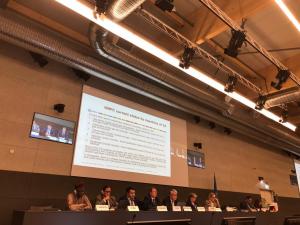Representatives from Kazakhstan, Kyrgyzstan, Tajikistan, and Uzbekistan met at the United Nations Economic Commission for Europe (UNECE) to discuss ways to unlock the resource potential and promote a sustainable future in Central Asia. The meeting was part of the UNECE Resource Management Week 2023 which addressed the critical issue of managing resources sustainably worldwide, with a focus on Europe, North America, and Central Asia.
Central Asia is heavily reliant on fossil fuels, with 95% of its total energy supply coming from unsustainable sources. To meet obligations under the Paris Agreement, there is an urgent need to scale-up renewable sources, electricity transmission and distribution, and energy efficiency.
The meeting participants discussed the potential for Central Asia to become a global leader in the production of critical raw materials, which are essential to produce high-tech products such as electric vehicles, wind turbines, and solar panels. Central Asia is home to a wide range of critical raw materials, including rare earth elements, lithium, and cobalt.
“Kazakhstan is one of the richest countries in the world, having practically all the periodic table’s elements,” said Chokan Laumulin, Vice-Chair, UNECE Committee on Sustainable Energy. “Working beyond borders towards a resilient energy system of harmonized critical raw materials management to support the Food-Water-Energy nexus could remove broader issues around a just transition and energy security.”
The meeting participants also discussed the importance of technical cooperation in the field of resource management and built on the Ministers’ joint statement on the 25th anniversary of the United Nations Special Programme for the Economies of Central Asia (SPECA) to harness resources for sustainable and resilient development in Central Asia.
The United Nations Framework Classification for Resources (UNFC) is an international scheme for the classification, management and reporting of energy, mineral, and raw material resources. UNFC can be used to help countries improve their resource management practices and promote sustainable development. “Having everybody on the same page in wanting to implement sustainable resource management is key”, said Arkady Rogalsky, Ministry of Natural Resources, Ecology and Technical Safety of Kyrgyzstan. “We are making steps towards this goal by implementing UNFC and the United Nations Resource Management System”.
According to the UNECE Carbon Neutrality Toolkit, the transition to a net-zero scenario in Central Asia would only require a minimal 2.15% increase in overall energy investment over 30 years. Therefore, technical cooperation is a priority in the field of resource management. “International standards are important: we live in a globalized world, and we need to adapt to the international system including the implementation of the United Nations Framework Classification for Resources” noted Sharifa Khudobakhsh, Deputy Minister, Ministry of Energy and Water Resources, Tajikistan.
Azimjon Kholikov, Director, Institute of Mineral Resources, State Committee of Uzbekistan on Geology and Mineral Resources observed that “International standards such as UNFC can support the implementation of sustainable resource management in new areas of extraction, as well as well-established areas of expertise to unlock the resource potential of Uzbekistan with an estimated value of $6 trillion”.
Experts agreed that strengthened technical cooperation is needed to utilize the present political drive for sustainable resource management. “There is political will to have this transition because we want to have a good understanding of our resource reserves. This is a main driver for our work on sustainable resource management”, said Yerlan Galiyev, Deputy Chairman, Geology Committee, Ministry of Industry and Infrastructural Development, Kazakhstan.


